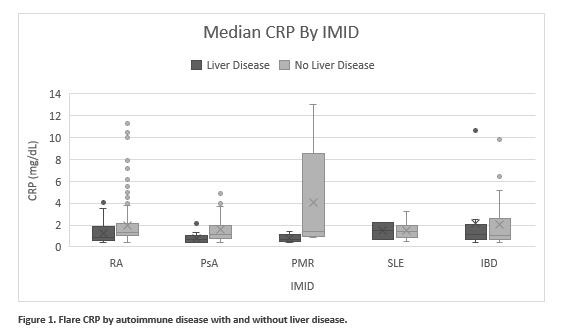Session Information
Session Type: Poster Session B
Session Time: 9:00AM-10:30AM
Background/Purpose: C-reactive protein (CRP) is an acute-phase reactant widely employed clinically as a marker of inflammation. Serum CRP level is generally elevated with any type of inflammation including infections and IMIDs. CRP is a protein synthesized by hepatocytes. Previous studies have shown lower CRP levels in response to infections in patients with chronic liver disease. We hypothesized that CRP levels would also be lower during active IMIDs in patients with liver dysfunction.
Methods: This retrospective cohort study used Slicer Dicer in Epic, our EMR system, to search for patients with IMIDs both with liver disease over the course of 10 years and without concomitant liver disease over the course of 1 year. Patients with liver disease were excluded if there was no clear documentation of liver disease staging (via MELD score, Child-Pugh score, fibroscan, fibrosure or liver biopsy). Patients were also excluded if a CRP level was not available during disease flare or active disease. Flare or active disease was determined by provider documentation. We arbitrarily considered normal CRP as 0.7mg/dL or lower, mild elevation of CRP as ≥0.8mg/dL and < 3mg/dL, and elevated CRP as ≥3mg/dL.
Results: We identified 68 patients with both liver disease and IMIDs (RA, PsA, PMR) and 296 patients with autoimmune disease without liver disease. Presence of liver disease had the lowest odds ratio (OR 0.25 p< 0.0001) of having an elevated CRP during flare. Each specific IMID, except SLE and IBD, had higher median CRP levels during active disease episodes in patients without liver disease than those with liver disease.
Conclusion: Overall, IMID patients with liver disease had lower serum CRP levels during active disease than their counterparts without liver dysfunction. This observation has implications for clinical use of CRP level as a reliable marker of disease activity in patients with IMIDs and liver dysfunction.
To cite this abstract in AMA style:
Ross Y, Ballou S. Reliability of CRP as an Inflammatory Marker in Patients with Immune Mediated Inflammatory Diseases (IMIDs) and Liver Dysfunction [abstract]. Arthritis Rheumatol. 2022; 74 (suppl 9). https://acrabstracts.org/abstract/reliability-of-crp-as-an-inflammatory-marker-in-patients-with-immune-mediated-inflammatory-diseases-imids-and-liver-dysfunction/. Accessed .« Back to ACR Convergence 2022
ACR Meeting Abstracts - https://acrabstracts.org/abstract/reliability-of-crp-as-an-inflammatory-marker-in-patients-with-immune-mediated-inflammatory-diseases-imids-and-liver-dysfunction/



